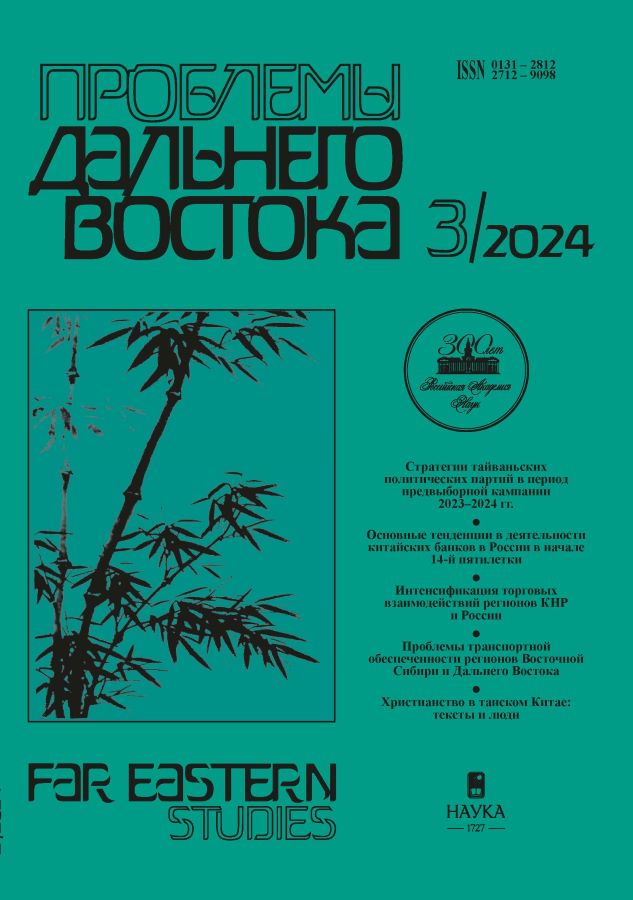Strategies of Taiwanese Political Parties during the 2023-2024 Election Campaign
- Авторлар: Kashin V.B.1, Pyatachkova A.S.1, SGoncharenko V.A.1, Alexandrova A.V.1
-
Мекемелер:
- National Research University Higher School of Economics
- Шығарылым: № 3 (2024)
- Беттер: 9-26
- Бөлім: Politics
- URL: https://medjrf.com/0131-2812/article/view/676310
- DOI: https://doi.org/10.31857/S0131281224030015
- ID: 676310
Дәйексөз келтіру
Аннотация
Авторлар туралы
Vasily Kashin
National Research University Higher School of Economics
Email: vkashin@hse.ru
ORCID iD: 0000-0001-9283-4528
Ph.D. (Political Sciences), Associate Professor, Senior Researcher Moscow, Russia
Anastasia Pyatachkova
National Research University Higher School of Economics
Email: apyatachkova@hse.ru
ORCID iD: 0000-0001-7319-2371
Deputy Head of the Asia-Pacific Sector of the Center for Comprehensive European and International Studies Moscow, Russia
Victoria SGoncharenko
National Research University Higher School of Economics
Email: vagoncharenko@edu.hse.ru
ORCID iD: 0009-0001-7272-2315
Research assistant, Center for Comprehensive European and International Studies Moscow, Russia
Arina Alexandrova
National Research University Higher School of Economics
Email: avaleksandrova_5@edu.hse.ru
ORCID iD: 0009-0005-9039-3446
Research assistant, Center for Comprehensive European and International Studies Moscow, Russia
Әдебиет тізімі
- Киреева А.А. «Движение подсолнухов» на Тайване: причины и последствия социального протеста // Социальный протест на современном Востоке / Под ред. Д.В. Стрельцова. М.: Аспект Пресс, 2016. С. 233-250.
- Консенсус 1992 года (Управление государством) // Китайский информационный интернет-центр. 02.04.2019. URL: http://russian.china.org.cn/china/China_Key_Words/2019-04/02/content_74638363.htm (дата обращения: 02.11.2023).
- Can DPP's new chair William Lai win the Taiwanese presidential election in 2024? // ThinkChina. January 17, 2023. URL: https://www.thinkchina.sg/can-dpps-new-chair-william-lai-win-taiwanese-presidential-election-2024 (дата обращения: 21.01.2024).
- Can the us trust Ko Wen-je’s pragmatism? // China Strategy. April 25, 2023. URL: https://www.chinastrategy.org/2023/04/25/can-the-us-trust-ko-wen-jes-pragmatism/ (дата обращения: 29.10.2023).
- Comprehensive and Progressive Agreement for Trans-Pacific Partnership (CPTPP). URL: https://www.dfat.gov.au/trade/agreements/in-force/cptpp/comprehensive-and-progressive-agreement-for-trans-pacific-partnership (дата обращения: 21.01.2024).
- Dotson J. Taiwan’s ‘Military Force Restructuring Plan’ and the Extension of Conscripted Military Service // Global Taiwan Brief. 2023. Vol. 8. Pp. 2-3.
- Feng E. Taiwan's China-skeptic ruling-party candidate wins presidential election // NPR. January 13, 2024. URL: https://www.npr.org/2024/01/13/1224576576/taiwan-ruling-party-wins-election (дата обращения: 16.01.2024).
- Grano S. The Geopolitical Implications of the Taiwanese Elections for China, the United States and the World // Asia Society Policy Institute. January 12, 2024. URL: https://asiasociety.org/policy-institute/geopolitical-implications-taiwanese-elections-china-united-states-and-world (дата обращения: 14.01.2024).
- Hua-chien Kao, Sunrise Huang, Sean Lin. New Taipei Mayor Hou Takes Leave to Focus on Presidential Campaign // Focus Taiwan. September 23, 2023. URL: https://focustaiwan.tw/politics/202309230020 (дата обращения: 16.01.2024).
- Marinaccio J., Remžová D., Chen Y. Taiwan’s 2024 presidential election and its candidates. What to expect in foreign policy and cross-Strait relations? // Central European Institute ofAsian Studies. CEIAS Papers. October, 2023. URL: https://www.researchgate.net/publication/374813044_Taiwan's_2024_presidential_election_and_its_candidates_What_to_expect_in_foreign_policy_and_cross-Strait_relations_Taiwan's_2024_presidential_election_and_its_candidates_What_to_expect_in_foreign_poli (дата обращения: 29.12.2023).
- Pertiwi S.B., Kabinawa L.N.R.W., Elias R.A. The Diplomacy of Quasi-State in the Territorial Disputes: Taiwan in the South China Sea // Journal Hubungan Internasional. 2020. Vol. 8. No. 2. Pp. 153-167.
- Political parties // Taiwan political database. URL: https://www.taiwan-database.net/LL-M10.htm (дата обращения: 29.10.2023).
- Rigger S. Taiwan’s 2024 elections: Everyone’s a winner—and a loser // Brookings. February 2, 2024. URL: https://www.brookings.edu/articles/taiwans-2024-elections-everyones-a-winner-and-a-loser/ (дата обращения: 10.02.2024).
- Taiwan’s 2024 Presidential Election: Analyzing Hou Yu-ih’s Foreign Policy Positions // Council on Foreign Relations. December 26, 2023. URL: https://www.cfr.org/blog/taiwans-2024-presidential-election-analyzing-hou-yu-ihs-foreign-policy-positions (дата обращения: 16.01.2024).
Қосымша файлдар









